
populous kraal called the Hart. Along the banks of the Great
River, and for several days journey up the Yellow River, or Ky-
Gariep, are many of their moveable villages. These do not extend
down the river more than two or three days’ journey below the spot
where we crossed it. It is difficult to define the boundaries of the
country inhabited by any of these wandering African nations ; not
only because they are perpetually shifting from one quarter to
another, but because the villages of two, and sometimes of three,
nations, are often so interlocated, that it can not easily be decided
to which of them the territory belongs. . In fact, with respect to
territory, they have none of those ideas which a European would
attach to the word. The soil appears never to be considered as
property, nor is it hardly ever thought worth claiming or disputing
the possession o f: the water and pasturage of it, is all that is rated
of any value ; and when these are exhausted, the soil is abandoned
as useless. Wherever they find a spring unoccupied, there they
feel themselves at liberty to plant their huts; and, on their removal,
others, if they chuse, come and fix their quarters. This last observation,
though holding good in many cases with respect to different
tribes, is applicable more strictly to different kraals, or families,
of the same tribe. On one side, the Kora stations are intermingled
with those of the Bachapins; on another, with the Jtamuchars; in
the middle, with the settlements of the Mixed, or Klaarwater, Hottentots
; and every where, with the kraals of the Bushmen. *
* A book, the numerous errors and misrepresentations of which Professor
Lichtenstein has, in his “ Travels in Southern Africa,” taken the trouble fully to expose,
tells its readers, that the Koranas are a formidable and cruel tribe of Bosjesmans, and that
they dwell “ directly east from the Roggeveld,” which “ for several months in the year
“ is entirely covered with s n o w ( a specimen of the accuracy of that writer’s description of
the colony;) and concludes its account of that people by stating, with peculiar sagacity,
that, “ though very good friends among each other while poor, from the moment they
“ have obtained by plunder a quantity of cattle, they begin to quarrel about the division of
,e the spoil ; and they are said to carry this sometimes to such an excess, that they continue
“ the fight and massacre, till, like the soldiers of Cadmus, very few remain on the field.”
Barrow’s Travels, page 404. In modern days, I confess, I know of nothing like this,
except the story of the two Kilkenny Cats, which fought “ to such an excess,” that they
actually devoured each other, and nothing was found remaining on the field, but the tips
of their tails.
On coming out of the waggon, a crowd of Koras gathered round
with an eagerness of curiosity which I did not expect, as a white man
could be no novelty to the greater part of them, who had had the
missionaries so long in their neighbourhood. The report of my
coming had long preceded my arrival; and, as they had been informed
that I was neither a missionary nor a colonist, but travelling
only for the purpose of seeing their country, they felt a desire to know
more about the stranger: and that their crowding round me, was
from pure curiosity, was strongly proved by their never once begging,
even for tobacco. This last circumstance appeared to me the more
remarkable, as I had been told that I should find begging an universal
practice. Their cloaks and bodies were entirely reddened
with ochre, and almost every one wore a leathern cap. Their huts
here were irregularly placed, and at some distance from the spring,
without even the shelter of a bush.
As far as could be seen in every direction, the tops of huge
masses of a hard blue rock *, appeared above the surface; and among
them some of a beautiful green color, but of exactly the same nature.
The water, issuing from a rocky hollow, did not run, at this season,
many hundred yards ; though the wide channel bore marks of having
carried a more plentiful stream. The ground was, in many places,
whitened \\yth a saline efflorescence ; and it is to this circumstance
that the spring owes its name. It was frequented by ‘ Namaqua
partridges’ or grous, and a few other birds.
It was nearly sunset before the waggons were in motion. The
Koras, in a friendly manner, wished us a pleasant journey, as we
drQve past their hu ts; and I departed from their kraal with a favorable
impression of the friendly character of the whole tribe.
. As this day was to end our travelling for the present, or at least
for three months, according to the plan I had proposed to myself;
a pleasing sensation seemed, with all of us, to attend the idea of
being about to terminate a long journey. For such, with reference
* Technically called “ Greenstone.”
Y Y 2